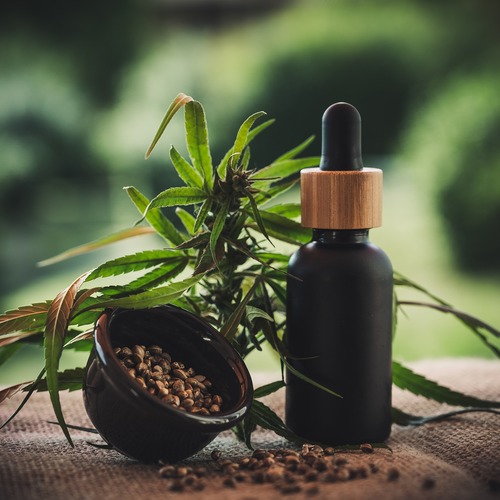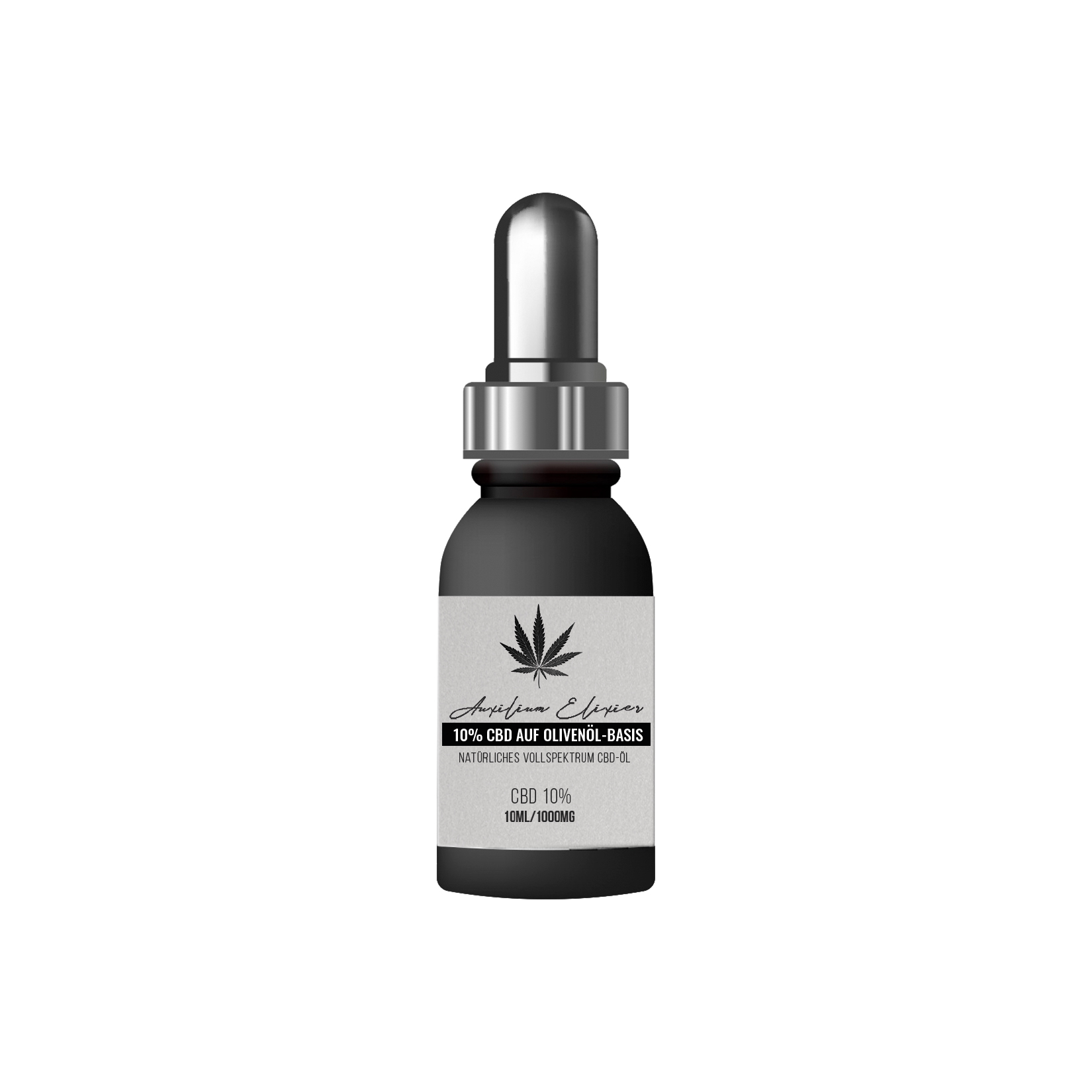CBD effect and possible applications

CBD (Cannabidiol) belongs to the so-called cannabinoids and is extracted from hemp plants. The intake in the form of oil and drops is associated with many health and well-being benefits.
For this reason, the effect of CBD is increasingly attracting the interest of scientists and more and more people are opting for a dietary supplement with the supposed miracle drug.
Below you will find all the important information about the effect of CBD. We will explain what happens in the body when you take CBD and in which situations cannabidiol might be helpful.
CBD drops have no psychoactive effect
Cannabidiol is known to be derived from hemp plants. You may therefore be sceptical and fear that you will get high by taking CBD drops. However, this fear is unfounded.
THC is a completely different cannabinoid and is responsible for the intoxication caused by the consumption of cannabis. Since the legislator prescribes a maximum THC content of 0.2 percent for CBD-containing products, you do not have to expect a psychoactive effect when taking CBD drops.
CBD has this effect in the human body
In order to understand the effect of CBD, it is first necessary to know that the body has a so-called endocannabinoid system (ECS). This is a part of our nervous system that has receptors almost everywhere in the organism and causes both psychological and physical effects through the production of molecules.
The exact mechanisms of ECS are not yet sufficiently known. However, it is believed that the effect of CBD is related to the endogenous cannabinoid system. ECS can obviously be activated not only by the body's own cannabinoids, but also by external cannabinoids such as CBD.
Endo- and phytocannabinoids
The body's own cannabinoids are called endocannabinoids. They are chemical messengers that interact with the receptors (CB1 and CB2) of the ECS and can trigger various reactions.
External cannabinoids are called phytocannabinoids. These include CBD and THC. They interact in a similar way with the endocannabinoid system, which also explains the effect of CBD.
The CBD effect on the endocannabinoid system
CBD does not bind directly to the CB1 or CB2 receptors of the endogenous cannabinoid system. Instead, it is thought to act by inhibiting the enzymes responsible for the degradation of the body's own cannabinoid anandamide.
In this way, CBD enables the body to produce more anandamide and thus ensure optimal functioning of the endocannabinoid system.
The functions of the ECS

Although its exact function has not yet been clarified, there is no doubt that ECS plays an important role in our body.
After all, its receptors are distributed throughout the body and can be found in the brain, spinal cord and intestines. The endogenous cannabinoid system is therefore probably responsible for the control of all important basic functions in the organism.
These include in particular the following functions:
- The mood
- The sensation of pain
- The metabolism
- Digestion
- The power of memory
- Sleep behaviour
- The immune function
The CBD effect has great potential for medicine
Science certainly still has some work to do on the impact of CBD. The fact that several thousand studies on the effects of CBD have already been carried out to date does not change this.
Nevertheless, it can be said that some very promising results have been achieved within the framework of research. The effect of CBD could therefore be useful in the treatment of many health problems.
It therefore suggests that cannabidiol may have great potential in the treatment of a wide range of diseases.
CBD is currently believed to have the following effects, among others:
- pain-relieving
- anti-inflammatory
- relaxing
- anxiety-relieving
- antidepressant
- antipsychotic
- antioxidant
- antibacterial
- neuroprotective
- antitumoral
CBD effect in the treatment of health complaints
The many properties attributed to CBD demonstrate the enormous potential that cannabidiol could have for medicine.
For example, CBD could be useful in treating inflammation and chronic pain, and could help alleviate the symptoms of many diseases, from Alzheimer's to diabetes to Parkinson's disease.
In the following, we will go into some selected health problems where the effects of CBD could help.
The Effect of CBD Oil in Pain Therapy
CBD oil has been successfully used in pain therapy for a long time. Experience reports show again and again that the effect of CBD often allows a significant reduction of the required dose of conventional painkillers.
In view of the often enormous addiction potential as well as the strong side effects associated with many conventional preparations, CBD could prove to be an ideal and side-effect-free supplement to classical pain therapy thanks to its effect on the sensation of pain.
CBD effect on inflammation
Inflammation is a defensive reaction of the body. It can be caused by numerous diseases and is supposed to remove potentially harmful cells from the organism.
Although inflammation is a normal reaction of the immune system, it is often associated with extremely unpleasant pain. Because cannabidiol is believed to be anti-inflammatory, CBD drops may help with various inflammatory diseases.
CBD oil effect in epilepsy
Epilepsy is a well-known chronic disease of the nervous system, characterized by seizures of varying severity and frequency. Studies and experience from patients indicate that CBD appears to have a positive effect and can help reduce seizures.
The effect of CBD on joint diseases
The effect of CBD is said to be pain-relieving and anti-inflammatory. For this reason, the use of cannabidiol may be useful in the treatment of osteoarthritis and arthritis. At least the CBD drops could help to reduce existing pain and inflammation in the joints.
CBD effect on digestive problems
Since there are also receptors in the intestines of the ECS, it is assumed that CBD oil supports the health of the intestines and can have a positive effect on digestive problems. In this way, cannabidiol could not only promote digestion but also strengthen the immune system.
CBD Oil Effect Against Stress and Sleep Disorders
Excessive stress and a constant feeling of overload are part of everyday life for many people. CBD is said to have a calming effect and thus help to cope better with existing stress, increase well-being and improve sleep.
CBD effect on nausea
Nausea and nausea can be caused by a variety of triggers. In most cases, the symptoms indicate an underlying disease. Regardless of the exact cause of the nausea, CBD oil appears to have a soothing effect in many cases, so taking the drops may be a well-tolerated alternative for the treatment of nausea and nausea.

CBD Oil Effect on Migraine
There is some evidence that the intake of CBD oil could also have an effect on migraine. This is reported at least by many users who have managed to reduce their symptoms with the help of cannabidiol.
Some scientists suspect that migraine is mainly caused by a cannabinoid deficiency in the body. The positive effect of CBD in this context is therefore probably related to the fact that it slows down the breakdown of the body's own cannabinoids.
CBD drop effect on skin problems
Skin problems like acne are a big problem for many people. According to studies, CBD seems to have a positive effect on the sebum production of the skin. Cannabidiol-containing products could therefore be an effective remedy for acne and other skin problems.
CBD effect on depression
Another area where people could benefit from the effects of CBD drops is the treatment of depression and similar mental disorders. This is at least suggested by the results of various animal studies that have investigated the effect of CBD on depression.
CBD oil has hardly any side effects
A big advantage of CBD oil is the fact that it hardly causes any side effects. In addition to a temporary drop in blood pressure, in some cases there is only a dry feeling in the mouth and fatigue.
These adverse effects of CBD can in most cases be easily eliminated by lowering the dose. There are no other known side effects of cannabidiol.
Who should do without the effect of CBD?
Although it is generally safe to take, some people still have to give up the effects of CBD. Some medicines may interact with each other. In the event that you are taking a medicine due to an illness, you should therefore only take CBD drops after consulting your doctor.
During pregnancy, however, it is advisable to avoid cannabidiol completely. CBD can interfere with placental growth and have a harmful effect on the unborn baby.

The most important facts about the CBD effect at a glance
The effect of CBD is made possible by the endogenous cannabinoid system. As a component of our nervous system, it is responsible for all important basic functions in the body. The intake of CBD oil probably increases the production of the body's own cannabinoids so that the ECS can work better.
The effects of CBD can be seen in pain therapy as well as in the treatment of inflammation, stress and anxiety disorders. In addition, the use of cannabidiol seems to be useful in the treatment of many diseases, some of them very serious.
Countless reports from enthusiastic users confirm the results of studies conducted on the effects of CBD.
If you want to get an idea of the effect of CBD yourself, you will find high-quality CBD oil in various concentrations in our shop.







